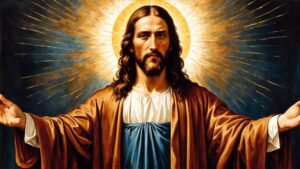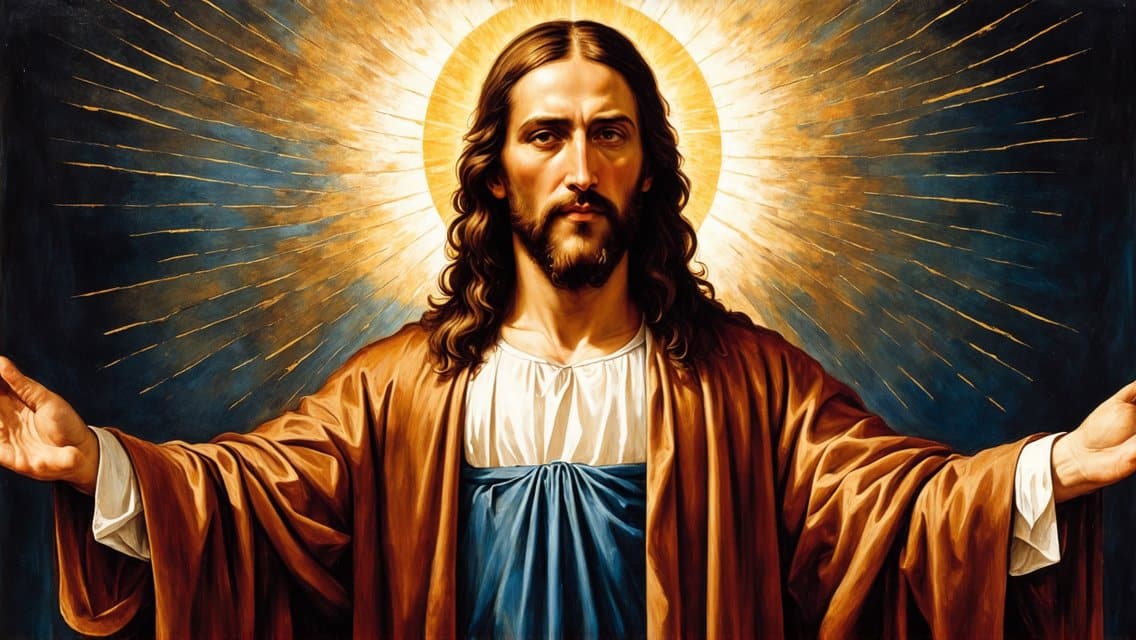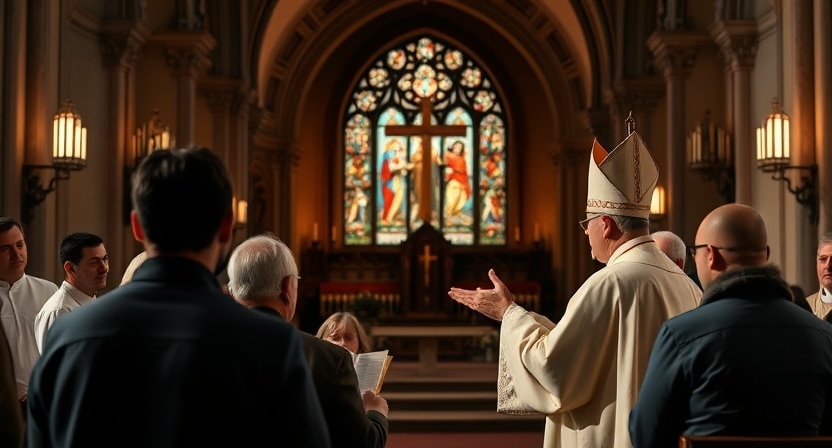SECOND SUNDAY OF EASTER
Cease doubting and believe
INTRODUCTION AND CONFITEOR
In today’s Gospel we meet Doubting Thomas. Each of us has something in common with him, for at times our minds are darkened by doubt.
The risen Jesus is with us now, and he says to us what he said to Thomas: ‘Cease doubting and believe.’ [Pause]
Let us confess our sins, never doubting God’s forgiveness.
I confess to almighty God ….
HEADINGS FOR READINGS
First Reading (Acts 2:42-47). Jesus said: ‘By their fruits you shall know them’. The first Christians showed the depth of their faith by the fruits they produced in their lives.
Second Reading (1 Peter 1:3—9). We base our hope of eternal glory on the resurrection of Christ from the dead. This hope helps us to bear patiently the trials of life.
Gospel (John 20: 19—31). By touching the wounds of the risen Jesus, Thomas’ doubt was turned into faith.
1st Reading – Acts 2:42-47
42 And they were persevering in the doctrine of the apostles, and in the communication of the breaking of bread, and in prayers.
43 And fear came upon every soul: many wonders also and signs were done by the apostles in Jerusalem, and there was great fear in all.
44 And all they that believed, were together, and had all things common.

45 Their possessions and goods they sold, and divided them to all, according as every one had need.
46 And continuing daily with one accord in the temple, and breaking bread from house to house, they took their meat with gladness and simplicity of heart;
47 Praising God, and having favour with all the people. And the Lord increased daily together such as should be saved.
Responsorial Psalm – Psalms 118:2-4, 13-15, 22-24
R. (1) Give thanks to the LORD, for he is good, his love is everlasting.
or:
R. Alleluia.
2 Let the house of Israel say,
“His mercy endures forever.”
3 Let the house of Aaron say,
“His mercy endures forever.”
4 Let those who fear the LORD say,
“His mercy endures forever.”
R. Give thanks to the LORD, for he is good, his love is everlasting.
or:
R. Alleluia.
13 I was hard pressed and was falling,
but the LORD helped me.
14 My strength and my courage is the LORD,
and he has been my savior.
15 The joyful shout of victory
in the tents of the just:
R. Give thanks to the LORD, for he is good, his love is everlasting.
or:
R. Alleluia.
22 The stone which the builders rejected
has become the cornerstone.
23 By the LORD has this been done;
it is wonderful in our eyes.
24 This is the day the LORD has made;
let us be glad and rejoice in it.
R. Give thanks to the LORD, for he is good, his love is everlasting.
or:
R. Alleluia.
2nd Reading – 1 Peter 1:3-9
3 Blessed be the God and Father of our Lord Jesus Christ, who according to his great mercy has regenerated us unto a lively hope, by the resurrection of Jesus Christ from the dead,
4 Unto an inheritance incorruptible, and undefiled, and that can not fade, reserved in heaven for you,
5 Who, by the power of God, are kept by faith unto salvation, ready to be revealed in the last time.
6 Wherein you shall greatly rejoice, if now you must be for a little time made sorrowful in divers temptations:
7 That the trial of your faith (much more precious than gold which is tried by the fire) may be found unto praise and glory and honour at the appearing of Jesus Christ:
8 Whom having not seen, you love: in whom also now, though you see him not, you believe: and believing shall rejoice with joy unspeakable and glorified;
9 Receiving the end of your faith, even the salvation of your souls.
Alleluia – John 20:29
R. Alleluia, alleluia.
29 You believe in me, Thomas, because you have seen me, says the Lord;
Blessed are those who have not seen me, but still believe!
R. Alleluia, alleluia.
Gospel – John 20:19-31
19 Now when it was late that same day, the first of the week, and the doors were shut, where the disciples were gathered together, for fear of the Jews, Jesus came and stood in the midst, and said to them: Peace be to you.
20 And when he had said this, he showed them his hands and his side. The disciples therefore were glad, when they saw the Lord.
21 He said therefore to them again: Peace be to you. As the Father has sent me, I also send you.
22 When he had said this, he breathed on them; and he said to them: Receive ye the Holy Ghost.
23 Whose sins you shall forgive, they are forgiven them; and whose sins you shall retain, they are retained.
24 Now Thomas, one of the twelve, who is called Didymus, was not with them when Jesus came.
25 The other disciples, therefore, said to him: We have seen the Lord. But he said to them: Except I shall see in his hands the print of the nails, and put my finger into the place of the nails, and put my hand into his side, I will not believe.
26 And after eight days again his disciples were within, and Thomas with them. Jesus cometh, the doors being shut, and stood in the midst, and said: Peace be to you.
27 Then he said to Thomas: Put in thy finger hither, and see my hands; and bring hither thy hand, and put it into my side; and be not faithless, but believing.
28 Thomas answered and said to him: My Lord, and my God.
29 Jesus said to him: Because you have seen me, Thomas, you have believed: blessed are they that have not seen, and have believed.
30 Now Jesus did many other signs in the sight of his disciples, which are not written in this book.
31 But these are written, that you may believe that Jesus is the Christ, the Son of God: and that believing, you may have life in his name.
HOMILY
Some people can’t see anything beautiful in the world unless the sun is shining. They have a shallow vision and a shallow understanding. Many love the outside, the surface of things and of people. They are unable or unwilling to go deeper. Yet if we are to get at the inner reality, the real person, we must go deeper. Often a rough surface can hide great strength, wealth, and beauty. Alas, many are put off by the surface.
Christy Brown, the disabled Dublin writer, died in 1981. One day, long before he became famous, he saw the picture of the English novelist, Margaret Foster, on the dust cover of one of her books, and immediately fell in love with her. He wrote her a fantastic letter, brimming with charm and wit. She replied, and thus began a warm friendship between them.
When Christy died she said: ‘He wrote me some very moving letters. It was clear to me even then that he had a great talent. However, though we corresponded for a long time, we never met.’ The fact that they never met at that time was entirely her fault. Christy was very anxious to meet her, but she was dead against it. Why? She had learned that he was severely physically handicapped. Now she had built up in her mind a beautiful image of him, an image that sprang from the kind of letters he wrote. She was afraid that if she met him her fantasy would be destroyed.
However, once when Christy was in London (he was now a well-known writer) he contacted her husband who agreed to bring him to meet his wife. Sure enough, when Margaret saw Christy’s severely crippled body, she couldn’t take it. She had fallen in love with a man who didn’t exist. Nevertheless, they continued to correspond for some time more, but for her it was never the same again. Eventually she stopped answering his letters, and their friendship ended, though she still retained a fond memory of him. Worse still, she burned almost all of his letters.
Yet what a pity she could not get herself to accept the real Christy. Christy could move only the toe of his left foot. With this he somehow mastered the art of typing. It was with this toe that he wrote those charming letters and his subsequent books. It was extraordinary that he could write anything at all. But it was almost miraculous that he could write letters full of charm and wit. Did his true greatness not lie in the fact that, despite his handicap, he still managed to write those letters? But Margaret was unable to see this. All she could see was a twisted body. Unable to take this, she eased him out of her life. The sight of his wounded body had shattered her illusion.
The death of Christ had a similar effect on the apostles. They had an idealised picture of the Messiah. The Messiah would be a great leader and a triumphant conqueror. The idea of a suffering and defeated Messiah was a million miles from their minds. Thus it was that, when he was crucified, all their hopes and almost all their beliefs were shattered at one fell blow. Thomas seemed to be affected worse than the others. We are almost scandalised at the frankness of his confession: ‘Unless I see and touch his wounds, I will not believe’.
We can understand his need to see and touch the person of Christ before he would believe he was risen. But why the insistence on touching his wounds? I believe it was not just that they enabled him to identify the risen Jesus with the Jesus who had died. I believe it went deeper than this. When he saw and touched those wounds Thomas realised that Christ was as good as his word. He didn’t just talk about love and preach it to others, he gave an example. In a flash, Thomas now fully grasped, not only the mystery of his resurrection from the dead, but of Christ’s love for him. Suddenly his doubts vanished, and his dreams were re-born.
I fear that many of us have an idealised picture of Christ. I imagine that it is a resplendent one – Christ shining in glory. Traditional popular religious pictures show Christ in a flowing robe, with spotless hands, long well-groomed hair, etc. Hence I fear that if we met the real Christ, especially the Christ of the passion, we would not only not recognise him, but would not want to have anything to do with him. Like Peter we would cry out: ‘I do not know this man’.
And yet, just as the greatness of Christy Brown lay in the fact that, in spite of his severe handicap, he could write so well, so the greatness of Christ (speaking in very human terms) lay in the fact that, despite being misunderstood, hurt, bruised, beaten, broken in body, he still went on loving. It is here that his greatness shines out. It was thus that he showed his love for us, and proved his fidelity to his heavenly Father. It was thus that he attained to his glory.
Jesus did not choose a way of ease and escapism. Neither can we avoid sacrifice if we want to be worthy disciples of his, hoping one day to share in his glory. Besides, even from a human point of view, there is more merit and more joy in a hard-won victory.
‘Doubt comes in the window when enquiry is denied at the door’.
(Anon).
‘If it’s true that people will believe only what they see, well then let them see’. (Thoreau).
PRAYER OF THE FAITHFUL
Let us pray that we may cease doubting and believe, as Jesus commanded Thomas. R. Lord, hear us in your love.
For Christians: that they may see the face of Christ in the faces of their brothers and sisters, especially those in pain and need. [Pause] We pray in faith.
For all government leaders: that they may have more faith in one another, and so help to spread understanding and cooperation among peoples. [Pause] We pray in faith.
For those who right now are going through a difficult time, and who are finding it hard to believe in God. [Pause] We pray in faith.
That we may be able to see Christ in the signs that he left us: giving us life in Baptism, forgiving us in Penance, and nourishing us in the Eucharist. [Pause] We pray in faith.
For local needs.
Let us pray:
God, our Father, you are never far away from us. You are part of the world we see, hear, touch, smell, and taste. Help us to be ever conscious of your abiding presence among us. We ask this through Christ our Lord.
COMMUNION REFLECTION
Some people think that if you have enough faith
life will be plain sailing for you.
This of course is not so.
The fact that you can swim
doesn’t give you control over the sea.
It doesn’t prevent you from getting knocked about.
In the same way faith doesn’t shield us
from the hard knocks of life or death.
What then does faith do?
It enables us to live in a topsy-turvy world
without getting lost or giving in to despair.
It gives us bearings.
Just as swimmers trust
that if they don’t panic,
and if they do a few simple things,
then the power of the sea will uphold them;
so believers entrust their lives
to a power greater than themselves,
a power greater than us all.
This power is the care of our heavenly Father,
who brought his Son Jesus back from the dead.


